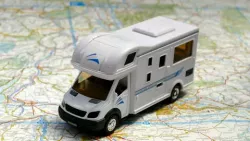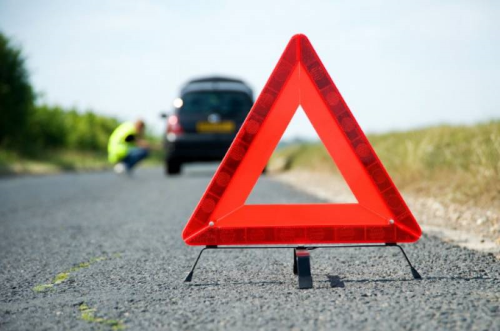
Tips for driving overseas
Driving in foreign countries presents a distinct set of challenges compared to driving in the UK. It's crucial to familiarize yourself with the local road rules before embarking on your journey. To assist you in ensuring a safe and enjoyable tour abroad, we've compiled some valuable tips.
Driving in France
At certain roundabouts in France, you'll encounter a sign that reads 'Vous n'avez pas la priorité,' indicating that vehicles already on the roundabout have the right of way. In the absence of such a sign, vehicles entering the roundabout hold the right of way. Additionally, you'll commonly encounter signs such as 'Toutes Directions' (all directions), 'Autres Directions' (other routes), and 'Péage' (toll motorway).
While navigating French roads, you may encounter main roads where you must yield to traffic approaching from the right. The following signs provide guidance on right-of-way priority.

In certain towns and villages, the speed limit of 50 kph (30 mph) is not explicitly indicated with road signs. Instead, you'll notice the town or village name displayed on a rectangular sign outlined in red. This particular sign serves as an indicator that the speed limit within this area is 50 kph.
As you exit the town or village, you'll encounter a similar sign bordered in black, featuring a red line through the town/village name. Once you've passed this sign, the speed limit reverts to what it was before entering the town or village.
When it comes to road crossings, pedestrians hold the right of way over vehicles. Pedestrians are required to demonstrate a "clear intention to cross," typically signaled by taking a visible step forward or making a hand gesture. The sole exception to this rule is in the presence of a designated pedestrian crossing located less than 50 meters away. Drivers who disregard this rule and fail to yield to pedestrians waiting to cross the road can face fines of up to €135.
Driving in Spain
A solid white line running down the center of the road serves as a clear indicator that overtaking is prohibited. In Spain, it's important to note that this line should not be crossed even when making a left turn, even in the absence of any specific 'no left turn' sign. If necessary, continue driving until you reach a 'cambio de sentido' (change of direction) sign to execute your left turn safely.
Additionally, on many Spanish roads, you may encounter a single white line on the near (verge) side of the carriageway. This marks a narrow lane designated for pedestrians and/or cyclists and should not be mistaken for a hard shoulder. A continuous line also signifies 'no stopping,' even if there is space to park entirely off the road. Crossing this line should be reserved for genuine emergencies and avoided otherwise.
When you come across 'halt' signs, it is imperative to come to a complete stop. Motorists who inch forward at these signs risk on-the-spot fines. When stopping at traffic lights, ensure that you halt early enough to maintain visibility of the signal's color, as traffic lights may be positioned to the side or overhead without an additional set directly in front of you.
Driving in Austria
Austria has implemented a mandatory safety measure on all dual carriageways and motorways to establish emergency corridors in cases of congestion. This precautionary emergency corridor is formed by drivers in the left-hand lane moving as close to the left side as possible, while drivers in the right-hand lane shift to the far right, thus creating a clear, unobstructed path down the center of the road. This arrangement ensures that emergency services have swift access when needed. Similar systems have also been adopted in Slovenia and the Czech Republic to enhance road safety.
Safety and security whilst driving in Europe

Most overseas holidays proceed without any untoward events. Nevertheless, on rare occasions, we do receive reports from individuals who have unfortunately encountered incidents of theft or attempted robbery.
Findinig an overnight stop
My suggestion is to consistently exit motorways when searching for overnight sites. Regrettably, as you may have observed in news articles or online reports, there is a growing concern regarding thieves targeting motorhomes parked overnight at service stations. These criminals remain undeterred even when they are aware that people are inside the vehicles, sound asleep.
While motorways offer convenient service stations and rest areas for a quick break and a picnic during your journey, it's imperative to avoid leaving your motorhome unattended at any point. To ensure your safety, it's advisable to seek out a proper designated site for overnight stops.
Reported Incidents
In regions including Southern France, Spain, and Portugal, the following tactics have been reported where individuals have been targeted with the aim of separating them from their money or belongings:
Service Station Scenarios:
At service stations, some individuals have returned to their vehicles only to discover a flat tyre. While they are in the process of changing the tyre, a seemingly helpful bystander approaches, offering assistance and advice. Meanwhile, their accomplices exploit the distraction to pilfer items from the vehicle.
Motorway/Dual Carriageway Deceptions:
On motorways or dual carriageways, there have been instances where drivers have reported other vehicles attempting to signal them to pull over, suggesting that there is a problem with their car or caravan. In some cases, thieves have even hurled small objects at the vehicle to coerce drivers into stopping.
It's crucial to exercise caution and be vigilant for potential encounters with individuals impersonating police officers. Legitimate law enforcement officers in matters related to traffic will always be in uniform. Unmarked police vehicles will prominently display a flashing electronic sign on the rear window, typically reading "Policia" or "Guardia Civil," and often feature blue flashing lights integrated into the headlights. These lights are activated by the police when they initiate a stop.
Precautions
I don't intend to discourage travel, but there are several measures you can take to minimize the likelihood of disruptions during your holiday:
Traffic Stops:
Only pull over on motorways and dual carriageways if a marked police car explicitly instructs you to do so. It's exceedingly rare for plainclothes officers in unmarked vehicles to initiate traffic stops. If you have any doubts, request to see identification and call 112 for verification.
Unsolicited Pull-Overs:
If another vehicle signals for you to pull over, exercise caution and refrain from stopping unless your motorhome genuinely feels unsafe to drive. If you do pull over, secure all valuables in the glove compartment and lock your vehicle.
Service Station Vigilance:
When using busy service stations, try not to leave your motorhome unattended. If you're not traveling solo, take turns using the facilities. While one person pays for fuel, the other should remain with the motorhome.
Flat Tyre Situations:
If you discover a flat tyre, ensure all your valuables are out of sight and secure before proceeding to change the tyre.
In the unfortunate event that you become a victim of robbery or attempted robbery, please report it immediately by dialing 112. In Spain, you can also reach out to 902 10 21 12, a number staffed by English-speaking personnel who will assist you in English, translate your statement, and forward it to the nearest police station. They will also guide you to the nearest police station for signing your statement.
Regrettably, we occasionally receive reports of thefts at campsites abroad, even those with security measures in place. Therefore, we recommend taking the following precautions:
-
Valuable Storage:
Avoid leaving wallets, handbags, or valuables in plain view. -
Divide Assets:
Do not keep all your cards and cash together in one location. -
Secure Your Space:
Whenever possible, ensure that windows, ventilation grates, and doors are securely fastened or locked at all times.

